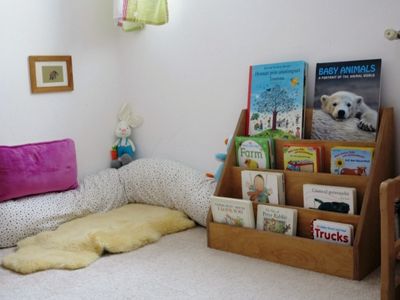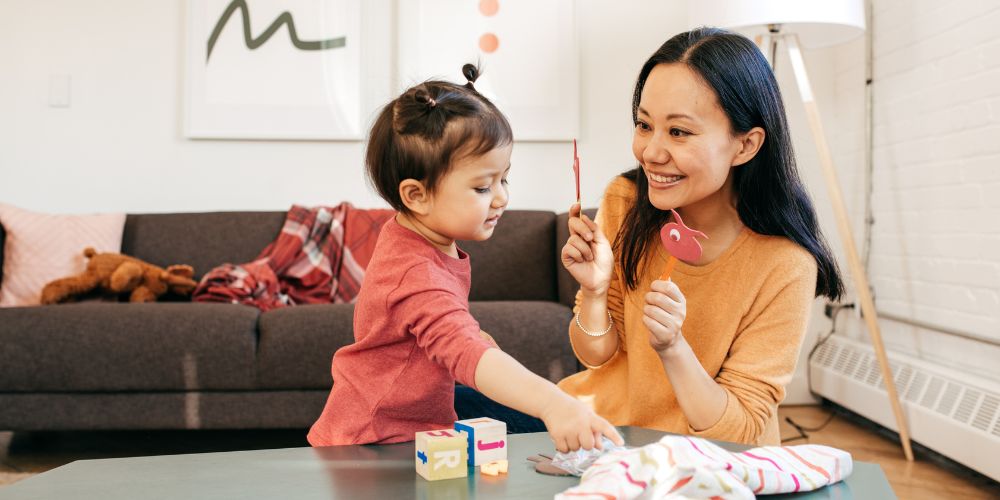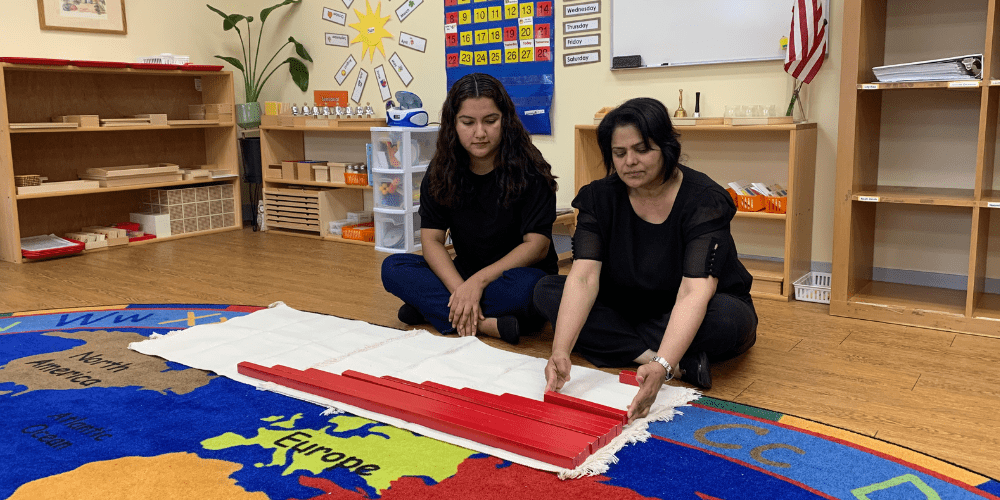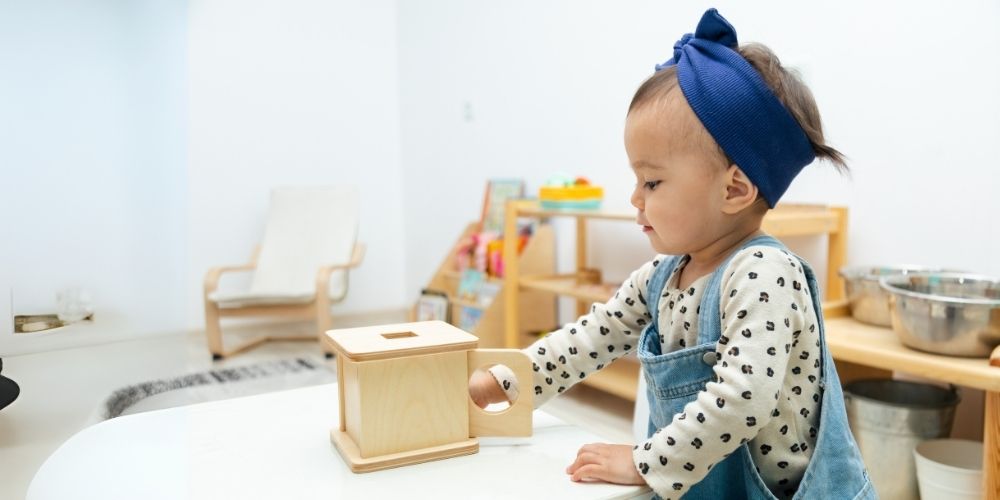How can we help children cultivate peace in the Montessori classroom, their own lives, when interacting with others, and within their broader communities? Peaceful education is an important component in the Montessori curriculum and teaches children emotional intelligence, self-regulation, and responsibility. Dr. Maria Montessori believed that “the education of children is the key to future peace.”
The Prepared Environment
In a Montessori Classroom, our goal is to intentionally prepare an environment that allows children to move and work mindfully, encouraging them to be aware of the space and needs of others. This awareness allows the classroom to become a small, peaceful community where all of the members work together to help each other. Each classroom has a peace corner where students can go for a minute to calm down and focus, or to resolve a conflict with another student. In this community, peace and respect is modeled not only by the adults, but, because of our mixed-age classrooms, older students also serve as role models for younger students.
How Does a Montessori Classroom Foster Your Child’s Development?
- Frequent Grace and Courtesy lessons and role modeling by teachers and older students.
- Encouraging independent thought through freedom within the environment
- Structured activities and interactions help students satisfy their inner needs.
- Self governance through self-direction and the encouragement to persevere and find internal motivators when completing work.
- Developing concentration, which when accomplished, increases the child’s confidence in their ability to learn.
Social-Emotional Intelligence & Routine
All of us, children included, have good days and bad days, which influence our behaviors and social-emotional capabilities at home and school. Social-Emotional Intelligence is the ability to recognize feelings and emotions within ourselves and our relationships with others, as well as reading and understanding how others are feeling; it’s an incredibly valuable practical life skill that takes time and intention to develop. We have found that socially competent young students (1) are helpful to others, (2) have a willingness to share, and (3) have the capacity to resolve their own peer problems.
While tantrums are normal behaviors in a young child’s development, it is important to understand where anger or strong emotions come from and how even young students can be taught to manage what they’re feeling. Sudden anger or rage, feeling out of control, having limited communication options, being tired or overtired, hunger, and/or overstimulation can all factor into a child’s brain regulation and how they respond to everyday moments. For example, while bedtime may not be your child’s favorite part of their day, you can ensure peace by creating and sticking to a consistent routine. If your child is refusing to put away their toys when it is time for bed, they may become frustrated. You can use the “As soon as…” method; this distracts from the issue yet gives some power to the child, who may be exhausted by that time in the day and thus more prone to strong emotions. Try saying a phrase to your child such as “I can see you don’t want to go to bed and it is bedtime. Do you want one story or two stories as soon as your pajamas are on?” Giving the child a choice among the things they can control will allow them to feel more in control and therefore, more at peace. Whenever possible children should be given safe options to choose from within the boundaries of your routine: what pair of pajamas would you like to wear tonight, which 2 books should we read, do you want to put the toothpaste on your toothbrush or would you like help.
Actively engaging your child in their daily routine should happen throughout the day as often as possible. A family routine and set structure helps children know what to expect from the day, and providing warnings ahead of changes or transitions can assist them in preparing themselves (and their emotions). We invite you to use our printable routine cards to help you implement a morning and night routine so you can further develop peace in your home.
In addition to creating consistent routines, you can create a designated peace corner or utilize a peace rose/dove (both of which are used in CMMS Montessori classrooms) to reinforce listening and active resolution skills at home. A tranquil area and peace symbol your child can use when they need to calm down allows them to properly use their social-emotional intelligence to regulate their body and emotions, and then better communicate their feelings and needs. You can also model this by taking some deep breaths, naming the emotion and offering options of how they can resolve what they are feeling; “I can see that you are feeling upset and frustrated. Would you like a hug or would you like to take a moment in the peace corner to take a few deep breaths and calm down?”


Naturally Encourage Peace using Positive Discipline
Positive discipline assumes the best of children, collaborates with them, and empowers them to develop self-discipline and problem-solving skills. When we model and teach our children these important social and life skills in a manner that is deeply respectful and encouraging for both children and adults, we can help children to become responsible and resourceful members of their community. Promoting self-discipline also allows young children to learn to employ kindness and firmness at the same time, and that discipline is neither punitive nor permissive. Parents who are both kind and firm are considerate of their child’s needs, development abilities, and personal preferences, this approach allows parents to clearly communicate their expectations and natural consequences – this is similar to being consistent with a daily routine, as clear expectations allow children to know what behavior and response is expected of them.
What have other parents tried that doesn’t work?
Read more about positive discipline.
Rather than using time out as a punishment, consider encouraging your child to go to a peaceful area where they can calm down to help their self-regulation. Peaceful corners for children do not have to be negative experiences, and when your child voluntarily goes to the peaceful space to calm down they will see it as a positive space where they have tools to regulate their emotions, as opposed to feeling alone or confused being sent away from everyone else. To create comfort within the peaceful area, allow your child to name the space and help decide what items or activities you will put in it. This will help your child feel a sense of ownership over the space and better understand it’s purpose. Please note that even positive time-out is rarely appropriate for children under the age of 3 or 4: at such a young age, even a positive time-out may prompt a fight/flight response, cause feelings of isolation, and does not train the child to identify or acknowledge their emotions.
Peace in the Community
CMMS celebrates many different cultures and worldwide holidays as one way of creating a sense of global community and support amongst all of our students and families. When our students come together to celebrate the unique qualities of our world, a sense of peace and mutual respect is present. This practice is a great experience for young children as they have the opportunity to explore their place in the world from a global perspective, try new foods from a variety of cultures, listen to stories from global authors, and enjoy musicians from different backgrounds. Children who are exposed to and gain appreciation of many cultures develop high levels of tolerance, acceptance and understanding and learn to celebrate the differences in themselves and in others.
In addition to promoting peaceful interactions, we work to develop a student’s emotional intelligence through practicing self-awareness, self-recognition, self-motivation, empathy, and relationship skills. These daily practical exercises enable children to understand their moods, manage their emotions and physical responses, have a natural drive for achievements without needing extrinsic rewards, convey non-judgmental emotions to another child, and understand conflict resolution strategies. Supporting your child’s emotional intelligence at home will reinforce what they learn at CMMS and can help ensure a peaceful family environment.
If you want to learn more about incorporating peace into your child’s life, check out our Montessori Monday Recording here.
For more information about how a Montessori School can impact your child’s education and future, you can learn more about CMMS & schedule a tour here.





